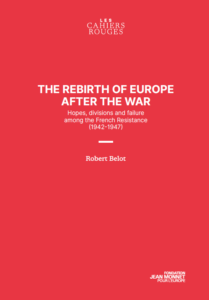Created in 1957 by Professor Henri Rieben, the Red books collection now includes 219 titles. Conceived as a vehicle for sharing and exchanging knowledge, it continues to be enriched regularly with new publications. The main concern of the collection is to address a wide audience. Since its creation, the collection has responded to the twofold imperative of fueling the debate on the integration process by publishing studies and position papers, and of safeguarding and spreading the memory of European construction by collecting and publishing testimonies of the protagonists.
Publication of a new Red Book this October 2022
The 219th Red Book, written in English, is entitled “The Rebirth of Europe after the War: hopes, divisions and failure among the French Resistance (1942-1947)”. Its author is Professor Robert Belot. The text is available in open access. Just click on the cover image below to access the full text. Hard copies of the book can be purchased individually at a price of CHF 20 in Switzerland and CHF 35 outside of Switzerland, including postage, from the Foundation’s secretariat (+41 21 692 20 90 / secr@nullfjme.unil.ch).
Robert Belot
The anti-Europeans of today organize their propaganda undermining the honorability and sincerity of the pioneers of the united Europe. They revise history in order to relativize the prescience and the courage of an elite that wanted to learn from the drama that Europe has known with fascism, Nazism and war. This book is a refutation against this “fake Knowledge”.
The highlighting of the itinerary of Henri Frenay, founder of the most important movement of the French Resistance, minister of General de Gaulle at the Liberation, who became one of the leaders of the European Union of federalists, allows us to rediscover one of the living sources of the desire for Europe and peace of those who have risked the worst for our freedom.
The idea of building a federal and democratic Europe was shared by the non-communist European Resistances, be they Italian, Romanian, German, Belgian or Dutch. It took shape in Switzerland, within the exile communities, and gave birth to the first Declaration of the European Resistances (July 1944). But this choice was a new struggle, sometimes violent. He encountered opposing forces, sometimes also from the Resistance, hostile to this project of overcoming national interests and sentiment.
Robert BELOT is a professor of contemporary history at the University of Lyon-Saint-Etienne, holder of the Jean Monnet European Chair “EUPOPA”. He heads the Erasmus Mundus Joint Master Degree DYCLAM+.

